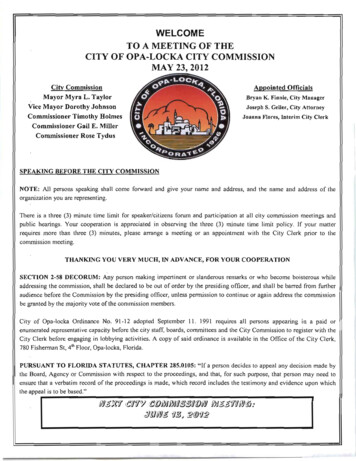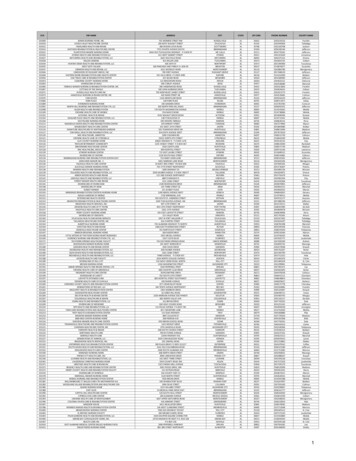
Transcription
A Poet in CenterCityAdam Fieled
PrefaceWhat “A Poet in Center City” focuses on most intensely is the complex interrelationshipbetween the four founding fathers of the Philly Free School— myself, Mike Land (John Rind),Nick Gruberg (Ricky Flint), and Jeremy Eric Tenenbaum (Christopher Severin). It was easilythe most explosive group context I’ve ever been part of— everywhere we went, we attractedattention. Part of the explosive energy was generated by our physical appearance together—I was the shortest, at 5’9/5’10, and we were all good looking, with dark hair and eyes. Welooked like brothers. None of us particularly lacked education; Nick and I were already ingraduate school; but we all drank, drugged, smoked, and shagged nonetheless. When we hitthe streets, the Philly Free School guys did massive divide and conquer routines just byambling into rooms (particularly bars, music venues, and art galleries). The streets of CenterCity Philadelphia had clearly never seen anything quite like us. Because the four-personsquare was split down the middle between bisexuals and hard-line heteros, we could aseasily end up at Woody’s as at Dirty Frank’s.But four explosive, abrasive personalities thrown into a cage together (no matter howglamorous the cage looks from the outside) is not easy to sustain; and, for us, thefractiousness was right there on the surface with the passionate élan. The “classic” period ofthe Philly Free School, with all four of us more or less completely engaged, lasted roughly ayear, from mid 2004 to mid 2005; it wasn’t exactly a Rimbaudian season in hell, nor was it aneffortless joyride. It was a tumultuous congeries of both; was, in fact, the single mosttumultuous year of my life. One of the big, cocaine-level highs for me was that I had (as Ithought might be possible when I arrived in Philly in ’99) created and let loose a wild beastinto the Philly arts scene. There was something about the shows we put on at the HighwireGallery that was feral— because we went out of our way to get everyone stoned and drunk,the nights there became bacchanals, with nothing timid, precious, or academic about them.The vibe was near-complete Dionysian abandon— well past the arid frigidity of Warhol’sFactory, or the rich kid pomposity of the Cedar Bar.There is, to my knowledge, no real parallel to the Philly Free School shows anywhere in thehistory of American art— not just for the bacchanalian frenzy, but for our wild, egalitariansense of multi-media. The Philly Free School shows at the Highwire Gallery featured poetry(bare or with accompanying videos/images), paintings, bands, films, and even DJs. Theshows were successful; people came. Even as the lurching four-headed beast ripped holes,willy-nilly, in everything and everyone it touched. There was always a violent undercurrentfollowing us around. What we were together wore us down individually, as well. The lurchingbeast was not especially discriminating— it would not stick at tearing into its own flesh. Weall wound up with blood on our hands— through sexual conquests and competitiveness,unrequited love, deep-in-our-cups harangues in many directions, and especially, gossip,gossip, and more gossip. America stood on the edge of a major recession— the times werenot particularly generous. I still believe that the spirit of those Free School shows at theHighwire Gallery is worth preserving— rare visions of reckless American freedom, butexecuted with thoughtful taste. That’s another reason why this book is worth reading, andwhy I wrote it.1
#1The story of my life in Center City begins on a hot August night outside Philly Java, on FourthStreet between South and Lombard. I had just met a poet named Christopher Severin. Hewas tall, a bit stocky, with a black bowl cut and a cherubic face. His cadence wasdistinctive— pressured, ironic, flippant on the surface. We were sitting at a table outside,overhung with foliage from trees, overlooking TLA video store across the street. Suddenly wewere overrun with teenagers— street kids, who never knew much but concrete andpavement. As they hovered around us (Christopher having known some of them before), Ihad a revelation of the wild vitality of Center City Philly. There were modes of being hiddenhere which I had never experienced before. The suburbs had been slow and moderate; thecollege town I had known even more so; New York had been so brutish I registered very littleat all. Center City was overwhelming in the right way— I had frissons from people and placeswhich were going someplace. As I walked the long way back to Twenty-First and Race, Iknew that I had stepped like an actor into a role I could play. The stage was set.2
#2Fast forward into the spring— it’s a chilly night in March. I’m sitting on a Septa train toManayunk with Bill Rosenblum and Pete Lawson, two musicians. Christopher Severin isletting me run an open-mike night at a coffee-joint called La Tazza on Cotton Street. Bill,Pete and I are stoned on pot. I’m paranoid on the train that I might have to take a piss (Septatrains have no bathrooms). I’ve brought a carton of eggs to break on my chest. But I wimpout— I give the eggs to one of the attendees. Bill is short and stout, wears glasses andrags— his day gig isn’t much. Pete’s a lanky redhead with a bushy red beard— how hemaintains himself is a mystery. They’re in the game to get high and have fun. At twenty-fourand in a state of constant excitement about what might happen in Philly, it’s enough for me toget attached to them. I need man-power and they need guidance. Christopher is afigurehead in his own right, but his scene is limited. The world converging around me isdynamic, but I have to shape it myself.3
#3There is the problem of mixing worlds and that nobody in Philly does it. Things remainsegregated, and to the extent that Philly artists don’t mix, the Center City art scene is all darkcorners. What happens if you match Christopher with Bill and Pete? But I’m not worried yet.One of my compartments is filled by the Center City “Goth” scene. I meet the nichestalwarts— Lee and Damon Buckner, and Baptiste Spurn. Lee and Damon are tall, black,mystical Christians and musicians. Lee is dominant, and always followed by a retinue ofGoth kids— Center City raised, precociously sex-and-drugs oriented, attired in black leatherpants, fishnet shirts, and chains. He plays a twelve-string acoustic guitar, and his songs areintense meditations on fairytale worlds— ghosts, goblins, vampires, demons. Damon iscalmer, more generous and hospitable, often with Lee to lend moral support. Baptiste is theirrival— a white, Europe-raised transplant with grandiose plans, whose front-man movesborrow heavily from the 80s New Romantics. He sings in a band called Station. The night Imeet him at the Khyber signifies— the whole Center City Goth crew are there, and I giveBaptiste my multi-media sales pitch. We’re all young and moving fast— the vibe is right. Still,I have to get used to the rough edges these characters live with— no health insurance, billswhich can’t be paid: scattershot approaches to leading a solid life.4
#4I have it in my mind to start doing things at coffeehouses, so I do. What Christopher and I doat Philly Java isn’t particularly intense— we sit in the cozy back room, reading our poems. Ifother poets show up, so much the better. One thing I notice about Christopher is that he hasa knack for graphic design. The fliers he designs for these open readings have a nouveauDada feel, and the images are memorable. The Last Drop, also, is available, and I arrange ashow there for Lee and Bill and Pete. One thing I’ve already let go of is the need to be themain attraction. If you want to put a scene together, you have to know how to juggle egos; tohold a hollow emptiness in your consciousness for others to enter. Bill likes to work with apoetess named Dara March. He plays keyboards while she recites. I’ve invented a monikerfor the series I’m putting together— This Charming Lab. The night of the show, the Dropoverflows with Lee’s minions. The proprietor of the Drop is fuming (for some reason) but theshow goes on. And I’ve got my girl Joan there, she’s Goth, and Baptiste and Lee hate eachother so Baptiste is missing, and the thronged downstairs is what I want forever.5
#5One thing I do with Bill Rosenblum is patrol Olde City and other neighborhoods, looking forvenues. We’re usually stoned when we do this; Bill teaches me the nooks and cranniesaround Center City where you can get stoned in the street. I’m in love with the Center Citystreets at night; they have an odd kind of peacefulness (especially when held up against theugliness of NYC). Bill and I are walking down Second Street in Olde City between Marketand Arch, and stumble across a joint called the Upside Down Café. It’s run by an attractiveAfrican-American woman with a Jamaican accent. She’s accommodating and gives us therun of the place, to do events as we choose. Now, This Charming Lab has a home. Theevents we put on at the Upside Down didn’t change much— we were “newbies,” and didn’thave much draw. But we were doing multi-media, literature and music together (poets andbands) in Center City Philly, and I thought (perhaps) I could investigate trying to get ThisCharming Lab some press. I lived on a daily diet of both serious stuff and the jejune freepress weeklies (City Paper and Philly Weekly). I was to learn that the press is its own darkcorner.6
#6Olde City is famous around Philly and the East Coast for its “First Fridays.” On the firstFriday of every month, all the Olde City art galleries opened their doors and offered newshows, wine and cheese. As of the turn of the century, Philly has produced nothing tocompete with New York’s century XX art scene. But the set-up is cozy and sensuous and itseemed logical at the time that on First Fridays This Charming Lab would set up shop at theUpside Down, which was advantageously placed to attract street traffic. Bill and Dara dospoken-word with keyboards, I read and play a few numbers on my acoustic, Christopherswooshes in to do his usual read-from-a-book routine. Looking back, This Charming Lab wasdoing the right thing for itself— starting small, building gradually. But in some ways, I’malready dissatisfied— my ambition for some kind of grandiosity is getting the better of me. SoI’m split in half— delighted by being in a new place, but frustrated by a small stage and aneven smaller response. Sometimes I can forget this dichotomy in a haze of pot smoke,sometimes I get depressed. Tonight the ambience is just right to allow me to get lost in it all.The Upside Down looks decent— white tiled floors, glass façade. And I get dragged by crazyJean over to the Painted Bride once festivities are over at nine.7
#7I find myself, through Lee and Damon and Baptiste, doing West Philly house parties too.That winter, Damon throws a house party the wildness of which I’ve never experienced. Thedrug situation is drastic— people are lining up to shoot H. Baptiste is there (he doesn’t mindDamon as much as Lee) with a stout, voluptuous blonde who looks like a porn star. We getrighteously stoned, and then everything begins to move in slow motion. The rest of the nightpasses me by like a movie— I’m in a dark room with Baptiste’s date, but too paranoid to hiton her; I’m standing on the porch, watching someone (for some reason) dive over the railinginto the front yard; I’m sitting (“like a spider,” someone said) watching the Goth crew dance toBauhaus; I’m noticing what everyone else noticed, that Lee failed to show up. Finally, at foura.m., I’m betraying my roots and phoning for a goddamned taxi. My truth is my truth— I’m notas desperate as these kids are. I don’t need to suffer the torments of hitting the West Phillystreets at four a.m. That’s why there will always be an edge of unease between me and theother participants in This Charming Lab. I’m not as authentically city as they are. But themiddle-class sense of self-worth I have is useful to them, too.8
#8By March, I manage to score a date for This Charming Lab at the Khyber Pass. For thisnight, it has to be all music. All the Station characters are becoming important in my life.Baptiste’s guitar player, David, was raised middle-class by two professors in Australia, of allplaces. He and his brother are in Philly to attend U of Penn. David is there to do math, buthis attitude is lax at best. He’s as good-looking as Baptiste, tall, broad, and jovial. He alsoprides himself on sleeping around. Our main topic of conversation is music. David has afondness for “classic rock” which Baptiste doesn’t share. What’s interesting to me aboutDavid is that working-class postures and attitudes fit him like a glove. He seems moreauthentic to the Center City scene than me. If downward mobility is the story of our earlyadulthood, David is more graceful and effortless about it. In any event, Station are toheadline the Khyber show. Lee has become difficult to manage and I’ve had to exclude him.He’s too narcissistic to participate in any scene. It’s a shame— he writes interesting tunes.But any artistic scene requires that you be able to jump out of yourself at least part of thetime, and he can’t. Meanwhile, I’m having bizarre love affairs, Jean, Joan, on the side. Theyadd to the general feeling of expectancy.9
#9Center City Philly is not just a conglomeration of artistic people for me but a conglomerationof places. I learn the character of different streets— Pine Street is genteel and refined, withseveral blocks devoted to antique shops and not much traffic. Walnut Street, the mainthoroughfare of Center City, has everything all together— first-rate restaurants like Le BecFin, glamorous boutiques, four-star hotels, and, of course, Independence Hall. ChestnutStreet, one block north, has a grungy feel— nothing fancy, but dollar-stores, low-enddepartment stores, and (then) the old Sam Eric movie theater. South Street, severa
Pete’s a lanky redhead with a bushy red beard— how he maintains himself is a mystery. They’re in the game to get high and have fun. At twenty-four and in a state of constant excitement about what might happen in Philly, it’s enough for me to get attached to them. I need man-power and they need guidance. Christopher is a figurehead in his own right, but his scene is limited. The world .
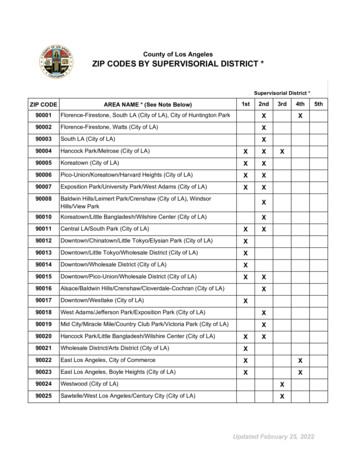
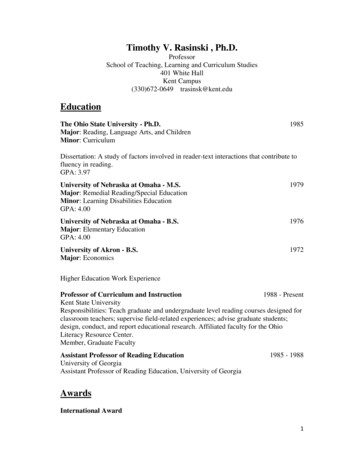
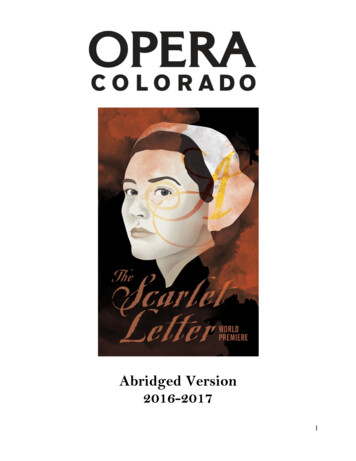
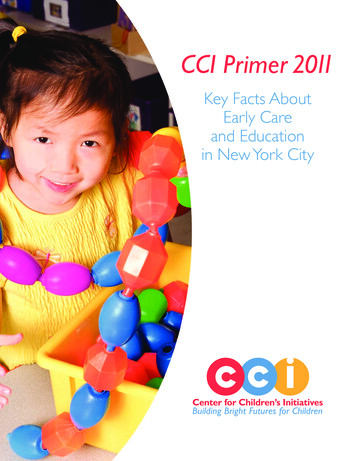
![Josh Smith - Agility [Read-Only]](/img/8/disaster-planning.jpg)
